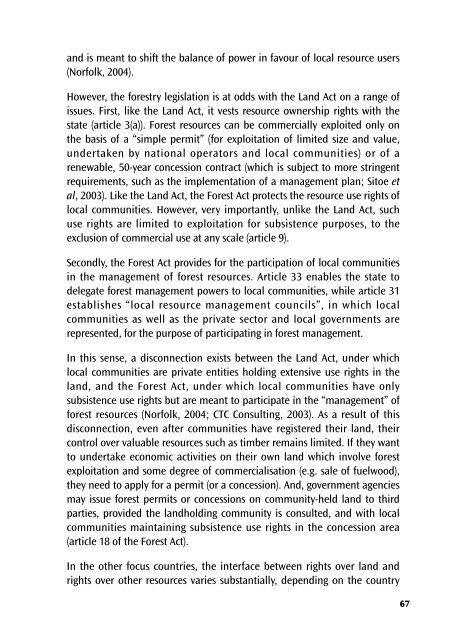Legal empowerment for local resource control
Legal empowerment for local resource control
Legal empowerment for local resource control
You also want an ePaper? Increase the reach of your titles
YUMPU automatically turns print PDFs into web optimized ePapers that Google loves.
and is meant to shift the balance of power in favour of <strong>local</strong> <strong>resource</strong> users<br />
(Norfolk, 2004).<br />
However, the <strong>for</strong>estry legislation is at odds with the Land Act on a range of<br />
issues. First, like the Land Act, it vests <strong>resource</strong> ownership rights with the<br />
state (article 3(a)). Forest <strong>resource</strong>s can be commercially exploited only on<br />
the basis of a “simple permit” (<strong>for</strong> exploitation of limited size and value,<br />
undertaken by national operators and <strong>local</strong> communities) or of a<br />
renewable, 50-year concession contract (which is subject to more stringent<br />
requirements, such as the implementation of a management plan; Sitoe et<br />
al, 2003). Like the Land Act, the Forest Act protects the <strong>resource</strong> use rights of<br />
<strong>local</strong> communities. However, very importantly, unlike the Land Act, such<br />
use rights are limited to exploitation <strong>for</strong> subsistence purposes, to the<br />
exclusion of commercial use at any scale (article 9).<br />
Secondly, the Forest Act provides <strong>for</strong> the participation of <strong>local</strong> communities<br />
in the management of <strong>for</strong>est <strong>resource</strong>s. Article 33 enables the state to<br />
delegate <strong>for</strong>est management powers to <strong>local</strong> communities, while article 31<br />
establishes “<strong>local</strong> <strong>resource</strong> management councils”, in which <strong>local</strong><br />
communities as well as the private sector and <strong>local</strong> governments are<br />
represented, <strong>for</strong> the purpose of participating in <strong>for</strong>est management.<br />
In this sense, a disconnection exists between the Land Act, under which<br />
<strong>local</strong> communities are private entities holding extensive use rights in the<br />
land, and the Forest Act, under which <strong>local</strong> communities have only<br />
subsistence use rights but are meant to participate in the “management” of<br />
<strong>for</strong>est <strong>resource</strong>s (Norfolk, 2004; CTC Consulting, 2003). As a result of this<br />
disconnection, even after communities have registered their land, their<br />
<strong>control</strong> over valuable <strong>resource</strong>s such as timber remains limited. If they want<br />
to undertake economic activities on their own land which involve <strong>for</strong>est<br />
exploitation and some degree of commercialisation (e.g. sale of fuelwood),<br />
they need to apply <strong>for</strong> a permit (or a concession). And, government agencies<br />
may issue <strong>for</strong>est permits or concessions on community-held land to third<br />
parties, provided the landholding community is consulted, and with <strong>local</strong><br />
communities maintaining subsistence use rights in the concession area<br />
(article 18 of the Forest Act).<br />
In the other focus countries, the interface between rights over land and<br />
rights over other <strong>resource</strong>s varies substantially, depending on the country<br />
67

















